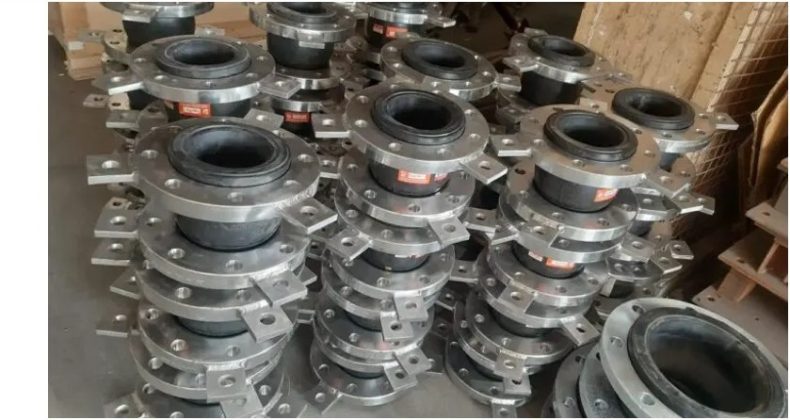Special Product Spotlight - Round to Rectangular Flexible Fabric Connection

Introduction: Expansion bellows, also known as expansion joints or flexible connectors, play a crucial role in various industries, including power generation, manufacturing, and construction. These components provide flexibility in piping systems, compensating for thermal expansion, contraction, vibration, and misalignment. In this article, we delve into the significance of expansion bellows, their types, applications, and key considerations in their design and selection.
Understanding Expansion Bellows: Expansion bellows are essential components designed to absorb dimensional changes in piping systems caused by thermal expansion and contraction, mechanical vibration, or seismic events. These bellows consist of flexible elements typically made from materials such as rubber, metal, or a combination of both. They can accommodate movements in multiple directions, including axial, lateral, and angular, ensuring the integrity and longevity of the overall system.
Types of Expansion Bellows:
- Metallic Expansion Bellows: Metallic expansion bellows are fabricated from various metals such as stainless steel, inconel, or titanium. These bellows are capable of withstanding high temperatures and pressures, making them ideal for demanding industrial applications. They offer excellent resistance to corrosion and fatigue, ensuring durability in harsh environments.
- Rubber Expansion Joints: Rubber expansion joints utilize elastomeric materials such as neoprene, EPDM, or natural rubber for their construction. These joints are particularly effective in dampening vibration and noise in piping systems. They provide flexibility and resilience, making them suitable for applications where movements are relatively low.
- Fabric Expansion Joints: Fabric expansion joints are constructed using layers of high-temperature fabrics reinforced with metal or synthetic materials. These joints offer flexibility and thermal insulation, making them suitable for applications involving large movements and extreme temperatures.
Applications of Expansion Bellows: Expansion bellows find extensive use in various industries, including:
- Power Generation: In power plants, expansion bellows are employed in piping systems to compensate for thermal expansion and contraction, vibration, and seismic events. They are utilized in steam lines, exhaust systems, and gas turbine connections.
- Manufacturing: Expansion bellows are used in industrial processes such as chemical processing, petrochemicals, and pharmaceuticals to accommodate movements in piping systems and equipment.
- Construction: In building construction, expansion bellows are installed in structures to absorb movements caused by temperature fluctuations, seismic activity, and settlement.
- Oil and Gas: In the oil and gas industry, expansion bellows play a critical role in pipelines, refineries, and offshore platforms. They accommodate thermal expansion and contraction, vibrations, and movements induced by seismic activity or ground settlement. Expansion bellows are utilized in piping systems for crude oil, natural gas, and various refined products, ensuring operational integrity and safety in demanding environments.
- HVAC (Heating, Ventilation, and Air Conditioning): Expansion bellows are essential components in HVAC systems, providing flexibility and vibration isolation in ductwork, exhaust systems, and air handling units. They absorb thermal expansions and contractions resulting from temperature fluctuations, maintaining system efficiency and reducing the risk of equipment damage. In commercial buildings, hospitals, and industrial facilities, expansion bellows contribute to optimal HVAC performance and occupant comfort.
- Marine: In the maritime industry, expansion bellows are employed in shipbuilding, offshore platforms, and marine propulsion systems. They compensate for movements caused by wave action, ship vibrations, and structural flexing, ensuring the integrity of piping and exhaust systems. Expansion bellows withstand harsh marine environments, including saltwater exposure and dynamic loads, enhancing the reliability and longevity of marine infrastructure.
- Automotive: Expansion bellows find applications in automotive exhaust systems, engine mounts, and fuel delivery systems. They absorb vibrations, reduce noise, and accommodate thermal expansions and contractions in exhaust pipes, preventing leaks and structural fatigue. Expansion bellows enhance vehicle performance, emissions control, and passenger comfort, making them integral components in modern automotive design.
- Aerospace: Expansion bellows are utilized in aerospace applications, including aircraft engines, fuel systems, and hydraulic systems. They provide flexibility and vibration isolation in critical components subjected to extreme temperatures, pressures, and dynamic loads. Expansion bellows contribute to the reliability and safety of aerospace systems, ensuring optimal performance in challenging operating conditions.
Design Considerations: When selecting expansion bellows for a specific application, several factors must be considered:
- Operating Conditions: Temperature, pressure, media, and environmental conditions dictate the material selection and design parameters of the expansion bellows.
- Movement Requirements: The magnitude and direction of anticipated movements, including axial, lateral, and angular displacements, influence the type and configuration of the expansion bellows.
- Installation Constraints: Space limitations, piping layout, and access considerations impact the selection and installation of expansion bellows.
- Compliance Standards: Adherence to industry standards and regulations ensures the performance and safety of expansion bellows in their intended applications.
Conclusion: Expansion bellows, or expansion joints, are indispensable components in various industrial applications, providing flexibility, vibration isolation, and seismic protection in piping systems. Whether in power plants, manufacturing facilities, or building construction, the proper selection and installation of expansion bellows are critical to ensuring the integrity and reliability of the overall system. By understanding the principles, types, and design considerations of expansion bellows, engineers and manufacturers can effectively mitigate the effects of thermal expansion, vibration, and seismic events, enhancing the performance and longevity of industrial infrastructure. For any query feel free to contact us.
